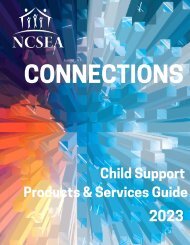April 2024 CSQ
Create successful ePaper yourself
Turn your PDF publications into a flip-book with our unique Google optimized e-Paper software.
The Differential Impacts of Tax Credits and Filing<br />
Status on Parents Who Live Apart<br />
by Elizabeth Morgan, Management Consultant, Public<br />
Knowledge, and Jim Fleming, Director, North Dakota Child<br />
Support Services<br />
It is widely known that raising children is expensive; however, the United<br />
States tax code provides some individuals raising minor children with<br />
several tax credits that can provide financial buffers, especially for lowincome<br />
families. Some of these tax credits include the Child and<br />
Dependent Care Credit, the Earned Income Tax Credit (EITC), and the<br />
Child Tax Credit (CTC). This article will focus on the EITC and the CTC.<br />
Some parents are also able to take advantage of filing taxes as Head of<br />
Household.<br />
Parents who live apart can experience a disparity in tax benefits between<br />
their households based on which parent has primary custody of the<br />
children, even when both parents contribute equally to raising the children.<br />
This article explores the differential impacts of the application of the EITC<br />
and CTC based on taxpayers’ income, filing status, and whether they claim<br />
their child(ren) as dependents.<br />
The Earned Income Tax Credit (EITC)<br />
In the 1960s and 1970s, there was a debate over reforming welfare, at that<br />
time known as the Aid to Families with Dependent Children (AFDC)<br />
program. AFDC caseloads were increasing and there was an interest in<br />
encouraging work and reducing the need for welfare. In 1975, Congress<br />
enacted the Earned Income Tax Credit (EITC) on a temporary basis as part















